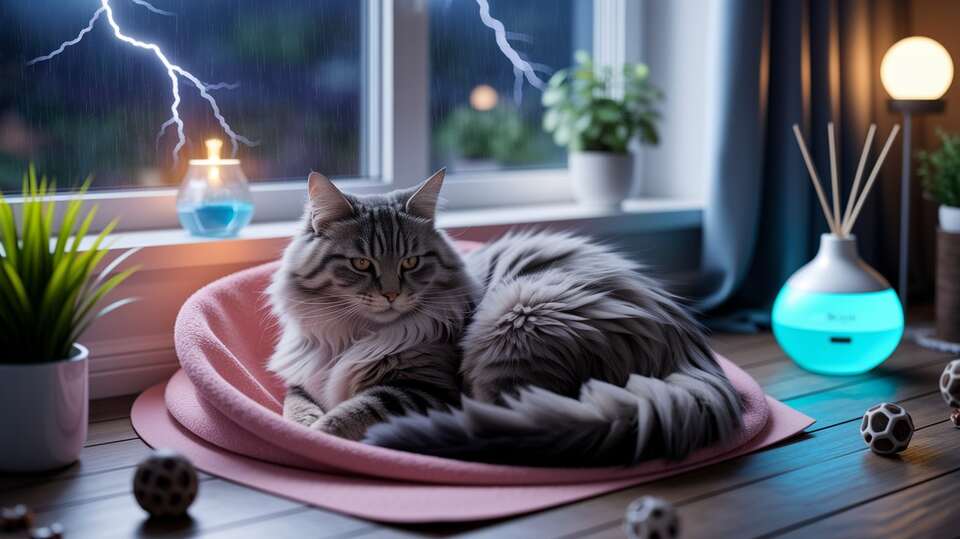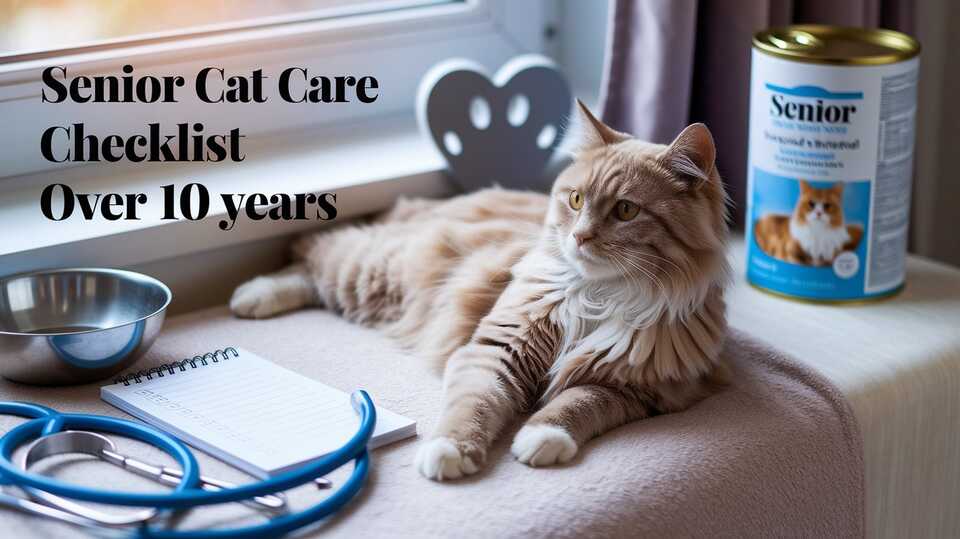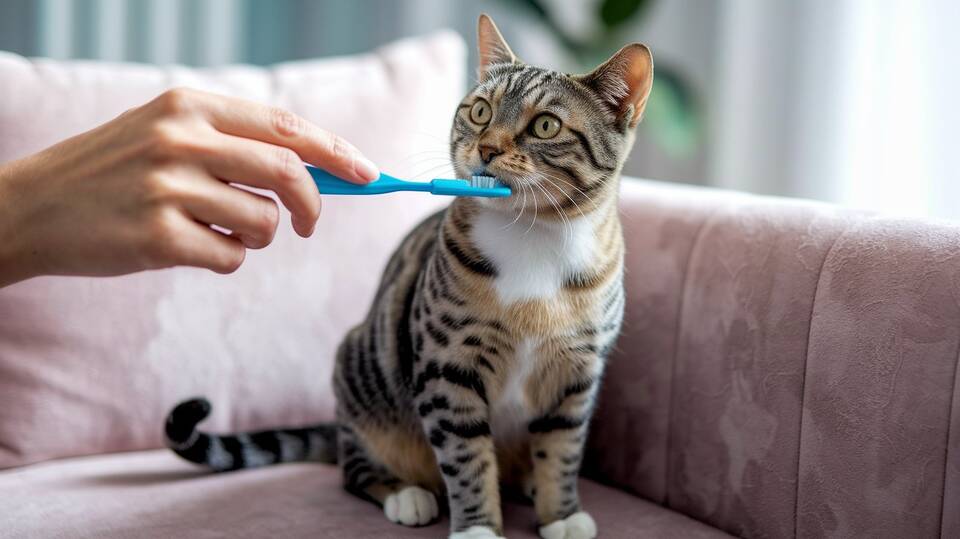
Introduction
If you’ve ever lived with a cat during a thunderstorm, you already know how stressful it can be—for both of you. The sudden cracks of thunder, flashes of lightning, and even the pressure changes in the air can send your cat into a frenzy of hiding, pacing, meowing, or trembling. And as a loving cat parent, watching your fur baby panic is heartbreaking.
The good news? You don’t have to rely solely on heavy medications to help your cat through storm anxiety. In fact, there are plenty of natural remedies for cat anxiety during thunder that can help your feline stay calmer, safer, and more secure. From creating a cozy storm shelter at home to using herbal remedies and pheromone diffusers, you have a whole toolkit of drug-free ways to make storms less scary.
In this guide, we’ll walk through why thunderstorms affect cats so much, the signs of anxiety to look out for, and the most effective natural remedies you can start using right at home.
Why Thunderstorms Trigger Anxiety in Cats
Cats are highly sensitive creatures. Their ears pick up a wider range of frequencies than humans, and their survival instincts make them hyper-aware of sudden, loud, and unpredictable sounds. Thunder, with its low rumbles and booming crashes, is exactly the kind of noise that unsettles them.
Here are some reasons storms often trigger anxiety in cats:
- Heightened senses – Cats hear thunder at a much lower decibel than we do, making it louder and more startling.
- Unpredictability – Unlike fireworks on holidays, thunderstorms are random, making them harder for cats to adjust to.
- Static electricity & pressure changes – Cats can sense barometric shifts and even static buildup in the atmosphere before storms.
- Trauma or past experiences – Rescue cats may associate thunder with stressful or frightening environments from their past.
Common Signs of Storm Anxiety in Cats:
- Hiding in closets, under furniture, or in dark corners.
- Restlessness or pacing from room to room.
- Excessive meowing, yowling, or growling.
- Trembling, dilated pupils, or crouching low.
- Over-grooming or refusing food and water.
Recognizing these behaviors early is the first step to helping your cat. The next step is to create a natural, calming environment that reassures them during storms.
Creating a Safe and Comforting Environment
One of the simplest and most effective natural remedies for cat anxiety during thunder is giving your kitty a safe, cozy place to hide. Cats instinctively seek shelter when they feel threatened, so setting up a comforting retreat can make a huge difference.
Tips for Building a Calm Storm Hideaway:
- Choose a quiet room: Preferably one with minimal windows. A closet or bathroom works well.
- Add familiar scents: Place blankets, bedding, or clothing that smells like you in their safe space.
- Soundproof the area: Close curtains, blinds, and windows to muffle noise and block flashes of lightning.
- Play calming sounds: White noise machines, soft classical music, or even cat-specific playlists can mask thunder.
- Keep essentials nearby: Litter box, water bowl, and a few toys to encourage comfort and normalcy.
By providing a safe “den,” you’re not just sheltering your cat—you’re reinforcing the feeling that storms are survivable and not as threatening as they seem.
Herbal & Natural Calming Aids
If your cat needs a little extra help, herbal and natural remedies can be an excellent addition. Always consult your vet before introducing any supplements, but here are some commonly used natural calming aids:
- Chamomile – Known for its soothing properties. Best given in vet-approved pet formulations (not human teas).
- Valerian root – Helps reduce nervous tension and promotes relaxation in cats.
- Catnip – While it excites some cats, for others, catnip has a sedative effect that may help during storms.
- Bach Rescue Remedy – A popular natural flower essence designed to reduce stress in pets.
- Lavender & Chamomile sprays – Natural sprays (pet-safe versions only) can be lightly spritzed in their safe space.
⚠️ Important: Never use essential oils directly on cats, as many are toxic. Always use vet-approved, pet-safe products.
Calming Products & Tools (Drug-Free Options)
In addition to herbs and sprays, there are several natural calming products that can help cats cope with thunderstorm stress:
- ThunderShirts or weighted wraps – These apply gentle, consistent pressure to the cat’s body, mimicking swaddling and reducing anxiety.
- Pheromone diffusers (like Feliway) – Release synthetic calming pheromones that mimic a cat’s natural scent markers of safety.
- Calming collars – Infused with natural herbs or pheromones to provide constant comfort.
- Puzzle toys & feeders – Keep your cat’s brain engaged and distracted from storm noises.
These tools work best when combined with a safe environment and reassurance from you.
Routine & Behavior-Based Remedies
Cats thrive on routine. Storms are unpredictable, but you can help minimize their impact by sticking to a consistent daily rhythm.
Tips for Behavior-Based Calming:
- Desensitization – Play recordings of thunder at a low volume during calm times, gradually increasing over weeks so your cat learns to tolerate the sound.
- Positive reinforcement – Offer treats and soothing words during storms so your cat begins to associate thunder with comfort.
- Stay calm yourself – Cats pick up on your emotions. If you act anxious, they’ll mirror it.
- Play therapy – Engage your cat in interactive play before storms to help them release nervous energy.
Nutrition & Supplements for Calming Cats Naturally
What your cat eats plays a role in their overall stress resilience. Certain supplements and natural nutrients can support a calmer nervous system.
- Omega-3 fatty acids – Found in fish oil, these support brain health and reduce inflammation that can worsen stress.
- L-theanine – An amino acid known for its calming effects. Available in vet-approved cat chews.
- Tryptophan – A natural serotonin booster that promotes relaxation.
- Natural calming treats – Many brands now make chews with chamomile, valerian, or L-theanine.
As with all supplements, check with your vet before introducing anything new.
When to Seek Veterinary Help
While natural remedies are safe and effective for many cats, there are times when storm anxiety becomes too severe. If your cat:
- Injures themselves while trying to hide.
- Refuses to eat, drink, or use the litter box during storms.
- Shows extreme distress despite trying natural remedies.
…it may be time to consult your vet. They can recommend stronger treatments or prescribe short-term medication, but often, natural remedies paired with reassurance are enough.
Preventive Measures for Long-Term Calmness
You don’t have to wait until thunder strikes to start helping your cat. Preventive care can make each storm easier:
- Stick to routines – Feeding and play schedules help reduce stress overall.
- Practice gradual desensitization – Thunder recordings, paired with rewards, build resilience.
- Maintain a calm home – Loud arguments, sudden noises, and stress in general make cats more vulnerable to storm anxiety.
- Seasonal preparation – If you live in a storm-heavy region, begin natural calming routines in spring before storm season hits.
Conclusion
Thunderstorms may be a part of nature, but your cat’s suffering doesn’t have to be. With the right combination of safe spaces, calming aids, herbal remedies, and gentle reassurance, you can ease your cat’s storm-related stress without resorting immediately to medication.
Remember, every cat is unique—what works for one may not work for another. The key is patience, consistency, and trying natural remedies first.
Your fur baby doesn’t have to face thunder alone. With love, preparation, and a few simple natural strategies, you can turn storm season into just another cozy cuddle time at home.
Also Read - Cat Adoption Red Flags to Watch: How to Spot Trouble Before It’s Too Late
🐾 FAQs: Natural Remedies for Cat Anxiety During Thunder
1. What are the signs of cat anxiety during thunder?
Common signs include hiding, trembling, pacing, meowing, or clinging to you. Some cats may also refuse food or show destructive behavior.
2. Do natural remedies really help cats with thunder anxiety?
Yes, many natural remedies for cat anxiety during thunder—like calming herbs, pheromone diffusers, and safe spaces—can reduce stress without medication.
3. What natural remedies can I try at home?
Options include catnip, valerian root, CBD for cats (vet-approved), pheromone sprays, calming treats, or simply providing a cozy hiding spot.
4. Can music or white noise help cats during thunderstorms?
Yes, soothing music, white noise, or TV background sound can mask thunder and create a calming environment for your cat.
5. How do pheromone diffusers work for cat anxiety?
Feline pheromone diffusers mimic natural calming signals, helping cats feel safe and reducing stress during loud thunder or other stressful events.
6. Are essential oils safe for cats with anxiety?
Most essential oils are toxic to cats. Instead, stick to cat-safe natural remedies or consult your vet before trying any oil-based products.
7. When should I see a vet for my cat’s thunder anxiety?
If your cat’s anxiety is extreme—causing harm, refusal to eat, or constant stress—consult a vet for guidance and possible treatment options.





I don’t think the title of your article matches the content lol. Just kidding, mainly because I had some doubts after reading the article.